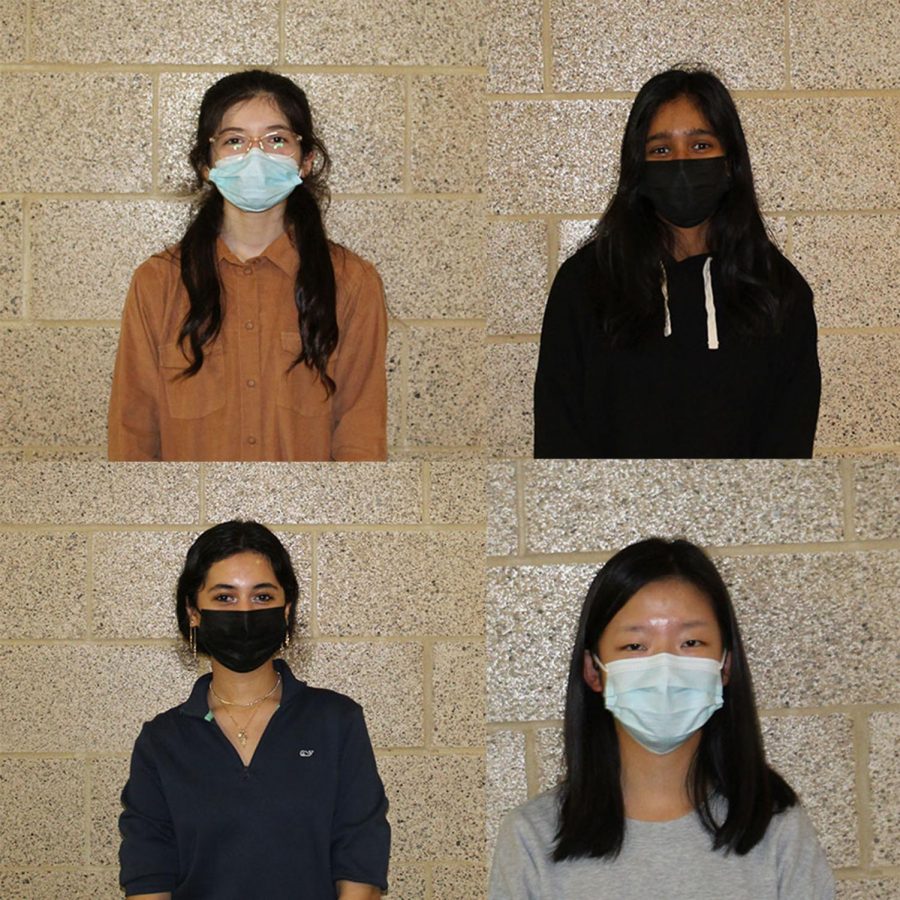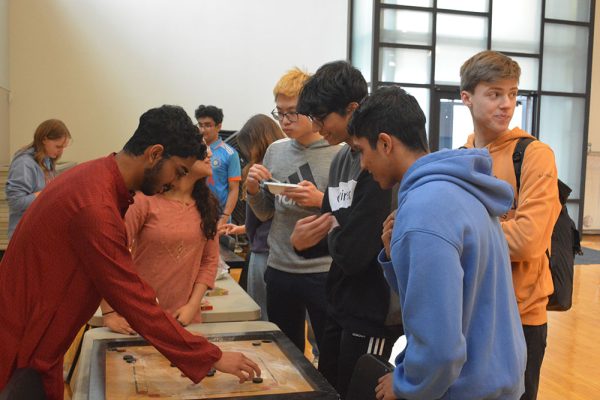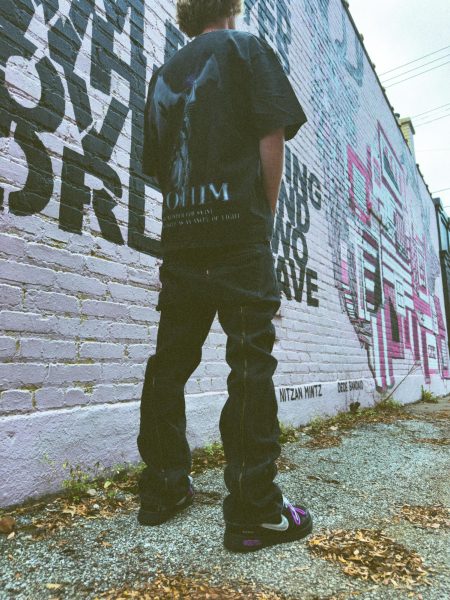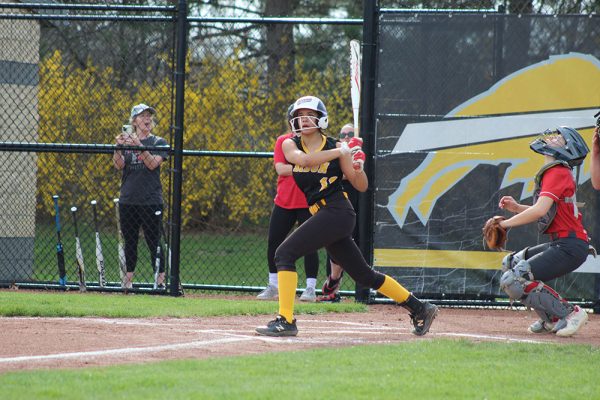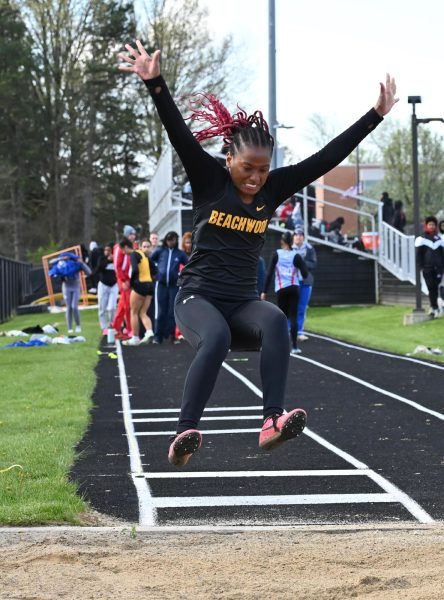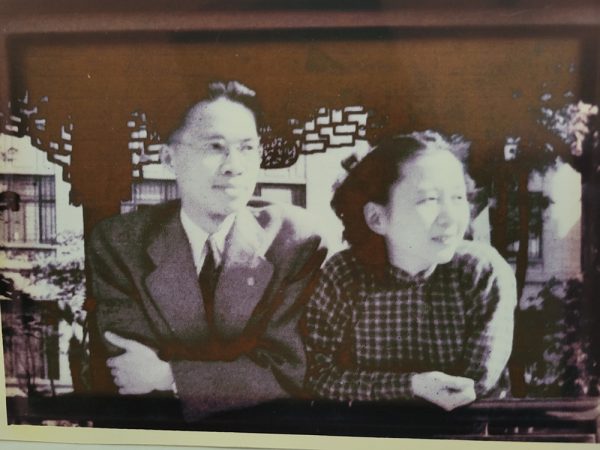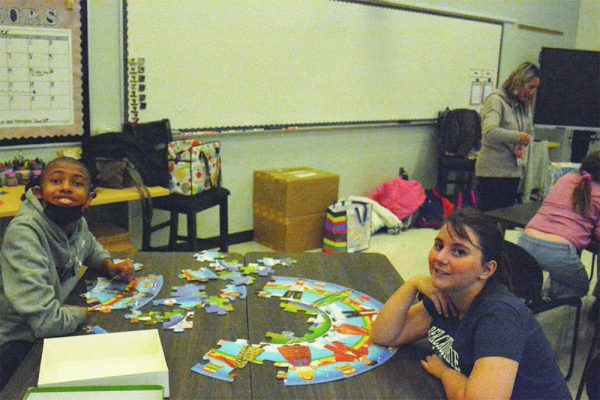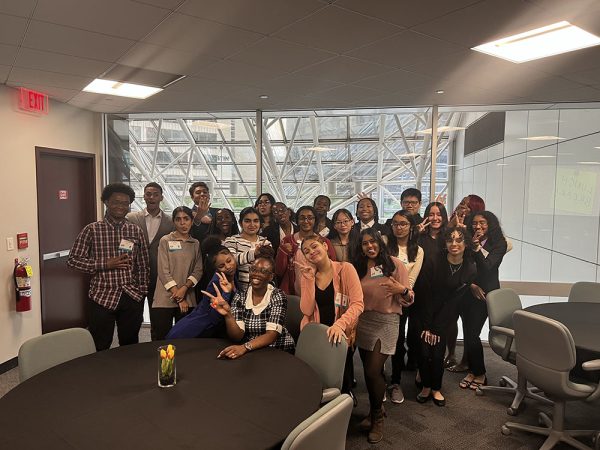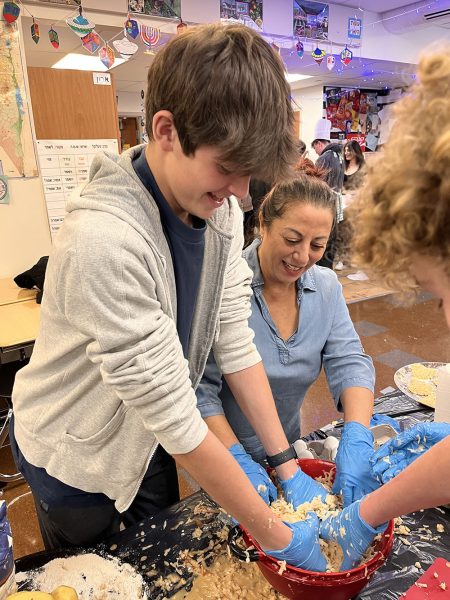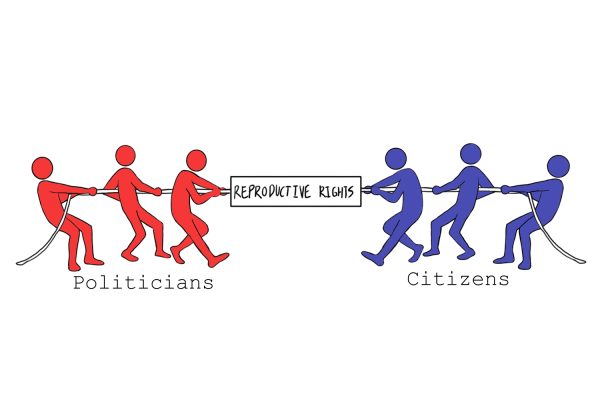Beachwood Embraces Vaccines
As of June, Beachwood had the highest vaccination rate in Cuyahoga County
From top left: freshman Anah Khan, senior Abby Cherian, senior Ran Duan and junior Kimia Adabi.
From the darkness of COVID-19, the vaccine brings a light of hope. But not everyone trusts the effectiveness of the vaccine.
A history of racism in healthcare and recent political polarization have impacted trust in public health officials and has made many Americans less willing to take the vaccine.
Local Vaccination Rates and Hesitation
There have not been many reports of vaccination hesitation in Beachwood, where the school district supports vaccinations.
“For the most part, not many people have come to me with concerns [about the vaccine],” nurse Kelly Debeljak said.
“Those who do have concerns are primarily just worried that it is a new vaccine that is still being studied,” she added. “But now that it has gotten official FDA approval for the Pfizer vaccine, people seem to feel better about that one.”
In fact, Cleveland.com reported the City of Beachwood to have the highest vaccination rate in Cuyahoga County, as 84.6% of Beachwood residents had started the vaccination process by the end of June.
I got vaccinated because… I want to keep myself healthy, first of all… and just for the courtesy of others.
— Junior Abby Cherian
But moving out from the City of Beachwood, vaccination rates go down. In Cuyahoga County, 56.4% of the population is fully vaccinated and 60.0% of the population has been vaccinated at least once, according to Covid Act Now, last updated on Oct. 8.
To make matters worse, Covid Act Now reports that Cuyahoga County is very vulnerable due to population density, age, and other risk factors, making it at higher risk than most 92% of U.S. counties.
In Ohio, 12.3 million doses have been administered, and 6.25 million people in our state have been vaccinated at least once. Overall, 50.67 percent of the population is fully vaccinated as of Oct. 7, according to Our World in Data. This places Ohio as 36 out of 50 in the percentage of the population vaccinated.
Two of the groups that report the most vaccine skepticism include African Americans and Republicans. According to a survey by Morning Consult, 35 percent of respondents in both groups report they are either unwilling to or uncertain about whether to get vaccinated for COVID-19.
There are many doctors saying that you should get the vaccine, and I wanted to make sure that I keep my family and myself safe.
— Junior Kimia Adabi
African American Hesitation
The skepticism on the part of African Americans is often attributed to a history of racism on the part of the nation’s public health establishment.
For instance, the Tuskegee study, conducted from 1932-72 by the United States Public Health Service and later by the CDC, deliberately infected 399 African American men with syphilis in order to track the progress of the disease. A group of men were infected without their knowledge or consent, and were not given penicillin to treat the disease.
The men were led to believe they were being nursed for a number of illnesses such as fatigue and anemia. The incentive to take part of this research was the free medical examinations, meals, and burial insurance they were offered, according to the CDC.
There have been many more instances of racism from public health officials — not just unethical studies but everyday mistreatment caused by the biases of medical professionals.
At times, the pain reported by African American patients is downplayed. According to Medical News Today, black patients have been denied pain medication under the misconception that they have thicker skin.
So I don’t get sick or get other people sick.
— Senior Alexia Roush
Harvard reports an incident where a black woman’s pain was underestimated and the patient was treated as if she was exaggerating her pain. Not only that, but it’s more likely for a black baby to die in the hospital during birth than it is for a white baby.
In fact, the U.S. Department of Health and Human Services reports an infant mortality rate for African Americans that is 2.3 times higher than that of non-Hispanic white Americans. With all this in mind, it isn’t surprising that many African Americans have a distrust of hospitals. That is one factor in vaccination hesitation.
It doesn’t really matter to me whether you get vaccinated or not but there are a lot of things you can’t do unless you’re vaccinated… like if you get [COVID-19] at school and you’re not vaccinated you have to stay home if you were around people… there’s some pros to it.
— Freshman Lee Colson
Republican Hesitation
Another factor is politics. In America, the vaccine has become a political symbol. And many Republicans are skeptical of the Covid-19 vaccine because of how quickly it was manufactured.
Some even claim that the virus is safer than the vaccine.
Many Republican politicians have spread rumors about the vaccine, including Donald Trump saying it can cause autism, according to PBS.
Twenty states, including Ohio, have passed bans on some or all vaccination mandates.
Governor DeWine signed House Bill 244 in the summer, which prohibited schools and colleges from mandating emergency use of vaccines not approved by the Food and Drug Administration. However, the FDA approved the Pfizer vaccine in August, providing schools with a legal path to requiring vaccines for those eligible to receive them.
Ohio isn’t the only state in which politicians have been pushing an agenda against vaccine mandates. Florida Governor Ron DeSantis signed Senate Bill 2006 in May which fines city governments if they choose to mandate vaccines. Businesses are also prohibited from requiring evidence of recovering from COVID-19 or of vaccination.
DeSantis himself got vaccinated with the Johnson & Johnson vaccine last April.
I have a little brother at home and I wanted to keep him safe.
— Freshman Anah Khan
Beachwood City Schools’ Efforts
Last year, Beachwood City Schools facilitated the vaccination of most teachers in the district beginning last February, and reached out to students about getting vaccinated last spring. They district even followed-up with families in September about opportunities to get the shots.
“The communication disseminated to our school community regarding the vaccine has been to provide information to our community so that they can make informed decisions,” the Beachwood City School District’s Director of Equity and Engagement Kevin Houchins wrote in an email.
Currently the school board is considering a ‘vax or test’ proposal that would require proof of vaccination or a weekly negative test for teachers and students over 16 who participate in extracurricular activities.
Superintendent Dr. Bob Hardis explained the justification for the initiative.
“Because science told us this is a way to make our school environment safer and to protect families,” Hardis said.
“Vaccination will also help keep students and staff in school,” Hardis added in an email.
In addition to vaccines, the district mandates that staff and students wear masks except during lunch and encourages three feet of social distancing.
“Why I got vaccinated”
Beachwood students report a range of reasons for wanting to get vaccinated.
Senior Abby Cherian got the vaccine as soon as it was available to teens 16 and older.
“I got vaccinated because… I want to keep myself healthy, first of all… and just for the courtesy of others,” she said.
Senior Alexia Roush had a similar motivation.
“So I don’t get sick or get other people sick,” she said.
Junior Kimia Adabi trusts the vaccine’s effectiveness and safety.
“There are many doctors saying that you should get the vaccine, and I wanted to make sure that I keep my family and myself safe,” she said.
Freshman Cay Lee Colson finds the pros outweigh the cons for getting vaccinated.
“It doesn’t really matter to me whether you get vaccinated or not but there are a lot of things you can’t do unless you’re vaccinated… like if you get [COVID-19] at school and you’re not vaccinated you have to stay home if you were around people… there’s some pros to it,” Colson said.
Freshman Anah Khan got vaccinated to protect her family’s health
“I have a little brother at home and I wanted to keep him safe,” Khan said.
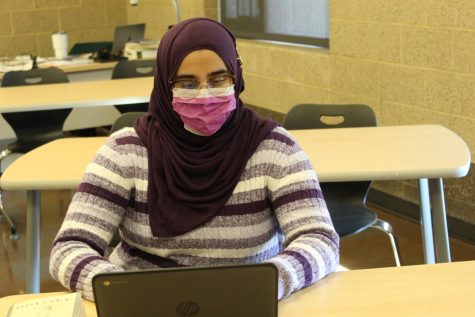
Hiba Z. Ali began writing for the Beachcomber in fall of 2019. She covers diversity in the school. In addition to writing for the Beachcomber, she also...



